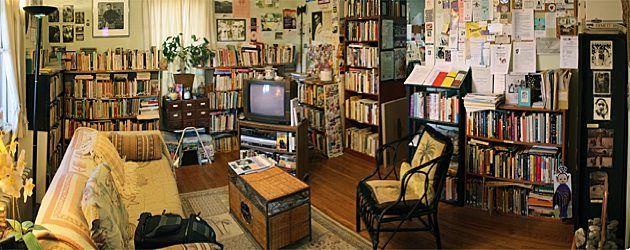By: Lauren Walleser/TRT Assistant Editor—
NORTHAMPTON, Mass.—The Sexual Minority Archives (SMA), housed in Northampton, Mass. for 31 years, is in danger of being put into storage if its curator, Bet Power, cannot raise enough money to purchase the home it is currently displayed in, a home in which he also lives. The Archives—a collection of nearly 10,000 books, over 900 periodical sets, tens of thousands of LGBTQI subject files, thousands of music and multi-media tapes, queer art works, rare posters, buttons, t-shirts, and more—provides educational resources to LGBTQI communities and scholars.
“The Sexual Minorities Archives is a LGBTQI community-built, community-controlled, and community-directed educational center, one of the oldest and largest national LGBTQI archives in the U.S., at which LGBTQI people can come and, in safety and support, learn our own history and study our own literature and art,” said Power. “The SMA exists to fill a huge gap in information since school systems, for the most part, do not teach about queer lives and history.” [pullquote] “The SMA exists to fill a huge gap in information since school systems, for the most part, do not teach about queer lives and history.” —Bet Power[/pullquote]
Power shared that between 300 and 500 people visit the SMA each year to conduct research for class papers and books, develop documentary films and other media, learn queer archival methods, intern and volunteer, meet and socialize. After moving to Massachusetts from Chicago, where the Archives were originally developed by a lesbian collective, Power rescued and relocated the materials several times until settling into his current residence. Now, the owner of the home is selling, giving Power the first option to buy.
“I have always felt that living within the Sexual Minorities Archives and curating the collections is a rare privilege,” said Power. “I share my home with the community, and I consider this house a home for the LGBTQI communities, as well as for me.”
Power worked for 30 years in corporate marketing communications, bringing home the financial resources to keep the Archives alive and accessible to the public. In 2008, a life-threatening illness led him to becoming disabled. Since then, he has worked to found the Sexual Minorities Education Foundation, Inc. (SMEF) as part of the process of building and sustaining the Archives. Power said the current housing situation is only pushing the SMEF further towards their goal of 501c3 nonprofit status, though they have been a registered educational nonprofit with the state since 2011. [pullquote]Power and the SMEF board of directors note that purchasing the house is a temporary step until they are able to conduct a major capital campaign to purchase the current house or another larger building as a permanent home for the Archives. [/pullquote]
Power and the SMEF board of directors note that purchasing the house is a temporary step until they are able to conduct a major capital campaign to purchase the current house or another larger building as a permanent home for the Archives. However, they recently received a $31,000 grant from the UMass Creative Economy Initiatives Fund to support paid stipends for UMass undergrad student interns to work in the SMA, hire an archival assistant, purchase archival preservation materials and digitization equipment, and develop a LGBTQI history walking tour of Amherst, Mass. The grant period is from July 1, 2014 through June 30, 2015, which Power said means they must keep their current location in order to fulfill the grant requirements.
“The local government in Northampton is aware of my current struggle not to have to relocate the SMA and cease our operations,” said Power. “The city is not in the habit of providing buildings to nonprofit organizations; however, supportive members of the city council are closely watching the situation with the Archives house with concern.”
Power has turned to the help of local citizens to support his efforts to get a mortgage for the location, and is also working to raise funds through on online GoFundMe campaign. The campaign is an attempt to raise funds to get a mortgage through the Neighborhood Assistance Corporation of America. In addition to the campaign, Power is also adding his personal savings to use towards the pre-closing costs and to buy down the mortgage interest on the home. If Power does not raise as much as the seller requires, he said another capital campaign through IndieGoGo is planned for later in the month.
“Buying the house is not the only way to save the Sexual Minorities Archives, but if we had to move the collections, it would be very costly not only for moving expenses, but possibly also for temporary archival storage,” said Power. “The SMA might survive, but we would lose the programs that we have been funded by UMass to develop in 2014-2015, and there could be as long as a year’s interruption in our operations and a closure of the Archives to the public during that time, if we were forced to relocate. That would hurt not only the SMA but the hundreds of LGBTQI people who need us to stay open, some of whom are now employed here.”
Several members of the SMEF board agreed that purchasing the home is the best solution to saving the Archives at this time.
“At the moment, both Bet and the SMA are facing significant housing insecurity,” said Dr. K.J. Rawson, SMEF board member. “It would be incredibly challenging to move the SMA now and it would limit day-to-day operations. If Bet is able to purchase the home, the Archives will continue to operate normally and will have a stable environment until we raise money for a more permanent location, there or at another property.”
Rawson also noted how the Archives have been used by scholars.
“I’ve found some really incredible research gems there and a number of my students have also been researching there over the past year,” Rawson said. “I love to spend time there—to research and attend board meetings—because it’s a queer affirming home for historical materials. I’ve conducted research at countless archives across the U.S. and Canada but the SMA stands out in my mind as a very special and unique place.”
Elizabeth Kent, another member of the SMEF board, spoke to how much the Archives mean personally. [pullquote]“Over this time, I learned what a critical resource the SMA is for students, researchers, and the queer community in the Pioneer Valley. I’ve become very attached to the SMA and feel extremely passionate about continuing to work with this organization, particularly through the current housing crisis but also into the future as it develops into a more accessible community education center.”—Elizabeth Kent, another member of the SMEF board[/pullquote]
“I started working with the SMA as a student researcher, then became a student intern, a volunteer, and finally a member of the SMEF Board of Directors,” said Kent. “Over this time, I learned what a critical resource the SMA is for students, researchers, and the queer community in the Pioneer Valley. I’ve become very attached to the SMA and feel extremely passionate about continuing to work with this organization, particularly through the current housing crisis but also into the future as it develops into a more accessible community education center.”
Pat Griffin, professor emeriti at University of Massachusetts and SMEF board member, shared what the future of the Archives may look like.
“I hope to make the Archives more visible and therefore more accessible to the public and to researchers,” said Griffin. “We currently sponsor walking tours of the LGBT history of Northampton which have been well attended and well received. I’d love to see us sponsor more activities like this. We are working on developing an online presence and I would love to see us sponsor more events in the local community for college classes and groups as well as other community members. I would also like to see us build strong partnerships with other historical and archival groups in Massachusetts.”
Some of the unique materials found at the Archives include a full run of magazines such as ONE and The Ladder; extensive queer people of color subject files and books; foreign-language queer and transgender books and magazines; a queer vinyl record collection; hundreds of author-signed books including a 1939 first edition copy of The World Is Round signed by Gertrude Stein and artist Clement Hurd; original paintings, drawings, and photography; archival materials on working-class LGBTQI, intersex, and genderqueer people; comprehensive transgender subject files; original research on pre-Stonewall, Pioneer Valley LGBTQI figures; and stacks of research papers developed by LGBTQI students and professors. According to Power, some books date back to the late 1800s, and many periodicals are pre-1969, along with hundreds of current titles.
“The motto of the SMA is Never Again the Silence because we learned from ACT UP in the 1980s that silence equals death,” said Power. “It is the routine and persistent erasure by society of the history, literature, and art of our LGBTQI people that allows ignorance to flourish into stereotypes and discrimination and violent oppression against us. It is only by breaking that silence—through educating ourselves and others and providing information about the truth of our queer lives—that we have a chance at achieving equality. Ultimately, the goal of the SMA and other LGBTQI archives is to educate others about the worth of LGBTQI lives and our accomplishments, challenges, and triumphs in order to move all LGBTQI people toward full equality.”
Given that Power was recently informed of repairs that need to be done to the home before the lender will allow him to close (estimated at $30,000), Power said another GoFundMe campaign to raise the repair funds is likely on schedule for August
For more information, check out the GoFundMe campaign and visit the Archives on Facebook. The deadline for the GoFundMe campaign is July 31.










I recall reading about these archives back in the early days of the Advocate–just did not know where they currently are located. They were once in California and over the years have done quiet a lot of traveling.. One suggestion is that they be given to a University or Museum or the Library of Congress with the stipulation that they never be sold or given away and made available online to anyone that wishes to use its research facilities where copyright issues have expired.
I thought the location was long ago settled. What needs to happen is a non-profit foundaton set up with funds raised for a permanent building and offices with space for the collection to grow. Failing that either as a gift to the Library of Congress with the stipulation that nothing will ever be thrown out or sold or a University Libary with the same stipulations and penalties if this occurs. Please learn from the Georgia O’Keeffe and University of Tennessee situation. The University got strapped for cash and was trying to or did sell the O’keefes art collection of her paintings with the stipulation that they always be displayed and never sold (according to her will). The University saw that they could get nearly 100-million dollars by selling off this collection and tried. I am not sure all their legal maneuvers worked but it is a lesson for all philanthropic gifts.